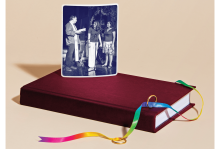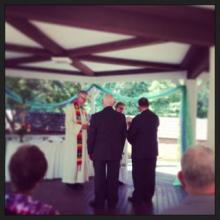Book of Discipline

IN AUGUST, LEADERS of the United Methodist Church from around the world are scheduled to meet, in Minneapolis and/or online. The denomination’s future will be on the table as delegates address the decades-old debate about full inclusion of LGBTQI members, including in same-sex marriage and ordination. Meanwhile, congregations around the U.S. and elsewhere have taken various approaches to the pastoral realities of their members. Lydia Wylie Kellermann and her father, retired Methodist pastor Bill Wylie-Kellermann, explain what it meant to support each other through Lydia’s wedding and the ecclesial reverberations that followed. Editor's note: After this issue went to print, the UMC postponed the 2021 General Conference until 2022.
Lydia Wylie-Kellermann: This is a story about risk and fear. It is a story about love. And it’s about the moments when standing beside the ones you love becomes an act of justice. It is the kind of story that begs us to ask what it means to be church. It is an ordinary story turned holy by the common occurrence of the very personal moments of our lives interacting with structural injustice and the way resistance and love unfold.
Ten years ago, I married Erinn. It was in a political moment when gay marriage was illegal and most denominations were still forbidding it.
Yet we were clear that we were not merely roommates or partners, but that marriage was a vocation we were summoned to together. We had no doubt that our relationship was blessed by community and by God. We wanted to promise our lives to one another and publicly offer our marriage as a gift back upon community.
It was a moment of total clarity for me, yet it was also really scary. We had to climb the steps of the church fearing we would pass through a line of protesters. We entered the sanctuary feeling the loved ones missing in the pews because they couldn’t support our marriage. We walked hand in hand down the aisle, combatting our own internalized homophobia, showing our love publicly with hands, promises, and kisses.
We could not have done it without the love of community. The dearly beloveds who filled that church held our hearts and knees steady.
One of those people that stood beside us and laid his hands upon us was my dad. He loved us, celebrated us, and summoned God to move in and through the day and into the rest of our lives. He co-officiated our service. As an ordained Methodist pastor serving a spunky, activist Episcopal church, he was risking losing his orders and losing his job.
Bill Wylie-Kellermann: Those were real fears. For as long as I can remember, I had said to myself that if a member of my congregation asked me to preside at a same-sex wedding, one discerned in pastoral care, that I would certainly do it. I was navigating a contradiction in the United Methodist Book of Discipline that enjoined me to offer pastoral ministry to all members in my care but a couple of paragraphs later forbade me to offer sacramental care to particular parishioners. This marriage was essentially pastoral work, but one that functioned as a public action of civil and ecclesial disobedience. I took comfort in Jesus’ ministry, where a personal act of healing would publicly violate Levitical laws of purity, say, putting him in trouble.

The United Methodist Church’s top court has ruled that the consecration of an openly gay pastor as bishop is against church law.
But, in a somewhat muddled ruling that could reflect the ongoing struggle to determine how great a role LGBTQ members can play in the second largest Protestant denomination in the U.S., the court also ruled that the Rev. Karen Oliveto, its first openly gay bishop, “remains in good standing.”

In January 2016, the Rev. Cynthia Meyer told her United Methodist Church congregation she felt “called by God to be open and honest” about who she is: “a woman who loves, and shares her life with, another woman.”

In the United States, United Methodists are fighting about whether to allow clergy to marry gay couples. In Liberia, divorce is on the line.
The United Methodist Church in Liberia recently voted to uphold a long-standing provision barring divorced clergy from running for the office of the bishop.
The church’s leaders say the ban brings moral credibility to the office and guides the conduct of those who want to be bishop.

Facing a wave of open defiance to church law, the top court of the United Methodist Church is set to consider rulings challenging church teaching on homosexuality.
The United Methodist Judicial Council will decide whether church ministries can advocate for the acceptance of homosexuality, whether ministers can officiate at same-sex ceremonies, and whether a regional conference can urge members to ignore portions of Methodist law.
The rulings made by regional conferences are among 17 items the court will consider at its Oct. 23-26 meeting in Baltimore.